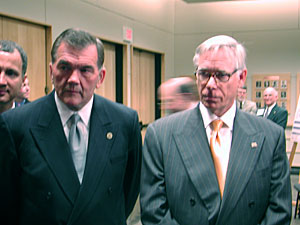|
Photos
Your Voice
|
University aims to thwart terrorist threats to food supply
July 6, 2004
The University of Minnesota officially launched its new research center on food safety on Tuesday. The U.S. Department of Homeland Security has awarded the university $15 million over three years to fund the center. The U's research will focus on ways to protect the country's food supply from natural contamination or terrorist attack. Homeland Security Secretary Tom Ridge and U.S. Secretary of Agriculture Ann Veneman attended the launch announcement at the U's Minneapolis campus.
Minneapolis, Minn. — If there's an outbreak of food poisoning anywhere in the country, it can take days or longer, to figure out the source of the contamination.
Researchers at the University of Minnesota's new Homeland Security National Center for Food Protection and Defense are working on ways to speed up information gathering on an outbreak, or prevent one altogether.
 | |||
Homeland Security Secretary Tom Ridge told an audience of about 60 agriculture researchers and business representatives that centers like the one at the university will boost the nation's security level.
"It's one more example of a national, coordinated effort, integrating the public, private, and academic sectors. It is one more signal to the world of our resolve to defeat terrorism and our commitment to get smarter, more sophisticated, and safer every day," Ridge said.
Ridge says protecting the nation's food supply is a huge and complicated task. He says safety efforts must be as comprehensive as the system that puts food on the tables of millions of Americans every day.
Infectious disease and bio-terrorism expert Michael Osterholm agrees. Osterholm is one of the directors of the U's new agro-safety center. He calls the American food supply the "vital link" that ties us all together. Unfortunately, he says, that link is very vulnerable.
"Just by the very nature of how it's grown, how it's shipped, how it's processed, how it's ultimately delivered and consumed. Having said that, we know today that there are people who want to do harm, not just to this country, but to certain segments of the population around the world, and we believe that food is a very likely way to accomplish that. And so, unfortunately we have to acknowledge this is a very high risk situation," Osterholm said.
Osterholm says the center will enhance research already underway in partnerships between U researchers and Michigan State University, North Dakota State and the University of Wisconsin, Madison. The U of M center is also working with dozens of Minnesota food and agriculture companies.
Secretary Ridge and USDA Secretary Ann Veneman got a taste of some of the research underway.
One company, associated with Green Giant, demonstrated software that could be used to track food at each point of its production and distribution.
The secretaries also got a look at a device that detects DNA and proteins in a food sample. It looks like a black breadbox with a CD player inside.
It's the invention of Vivek Kapur, director of the University of Minnesota's biomedical genomics center, who explained that the device gives a diagnostic readout of a suspicious sample.
"What used to take many different kinds of tests to do, you can now do on a single device, and in very quick time. This is a portable device, so first responders, for instance, firemen, or ambulance workers, can take this device along," according to Kapur.
Kapur says detection devices like his will be a key component of the diagnostic project of the U's agro-safety center.
Creation of the U's Homeland Security Centers of Excellence program was announced in April. In addition to the University of Minnesota's center, there are two others. Texas A and M will address potential threats to animal agriculture. The University of Southern California will conduct risk and economic analysis of terrorist events.
Ridge says his department is taking applications for a fourth center that will focus on the social the behavioral aspects of terrorism and counterterrorism.
|
News Headlines
|
Related Subjects
|

